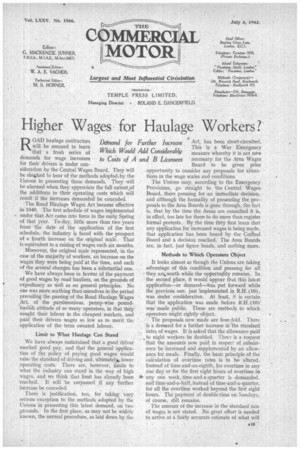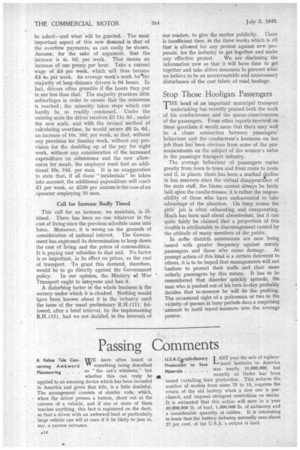Higher Wages for Haulage Workers?
Page 15

Page 16

If you've noticed an error in this article please click here to report it so we can fix it.
ROAD haulage contractors will, be amazed to learn that a fresh series of demands for wage increases for their drivers is finder consideration by the Central Wages Board. They will be shocked to hear of the methods adopled-by the Unions in presenting these demands. They will be alarmed when they appreciate the full extent of the additions to their operating costs which will result if the increases demanded be conceded.
The Road Haulage Wages Act became effective in 1940. The first schedule of wages implemented under that Act came into force in the early Spring of that year. To-day, little more than two years from the date of the application of the first schedule, the industry is faced with the prospect of a fourth increase on the original scale. That is equivalent to a raising of wages each six months.
Moreover, the original scale represented, in the case of the majority of workers, an increase on the wages they were being paid at the time, and each of the several changes has been a substantial one.
We have always been in favour of the payment of good wages by road hauliers, on the grounds of expediency as well as on general principles. No one was more scathing than ourselves in the period preceding the passing of the Road Haulage Wages /Act, of the parsimonious, penny-wise poundfooliSh attitude of so many operators, in that they sought their labour in the cheapest markets, and paid their drivers wages so low as to merit the application of the term sweated labour.
Limit to What Haulage Can Stand We have always maintained that a good driver merited good pay, and that the general application of the policy of paying good wages would raise the standard of driving and, ultimatel* lower operating costs. There are, however, limits to what the industry can stand in the way of high wages, and we think that limit has already been reached. It will be surpassed if any .further increase be conceded.
There is justification, too, for taking very serious exception to the methods adopted by the Unions in presenting this latest methods, on two grounds. In the first place, as may not be widely known, the normal procedure, as laid down by the Act, has been short-circuited. This is a War Emergency measure whereby it is not now necessary for the Area Wages Board to be given prim opportunity to consider any proposals for altera tions in the wage scales and conditions.
The Unions may, according to the Emergency Provisions, go straight to the Central Wages Board, there pressing for an immediate decision., and although the formality of presenting the proposals to the Area Boards is gone, through, the fact is, that by the time the Areas are consulted it is, in effect, too late for them to do more than register formal protests. By the time thy first learn that any application for increased wages is being made, that application has been heard by the Central Board and a decision reached. The Area Boards are, in fact, just figure heads, and nothing more.
Methods to Which Operators Object It looks almost as though the Unions are taking advantage of this'condition and pressing for all they are worthwhile the opportuility remains. In the second place, it would appear that this latest application—or demand—Aras put forward while the previous one, just implemented in R.H.(10), was under consideration. At least, it is certain that the application was made before R.H. (10)° was made public. These are methods to which operators might rightly object.
• The proposals now made are four-fold. There is a demand for a further increase in 'the standard rates of wages. It is asked that the allowance paid to night workers be doubled. Then is a request that the amounts now paid in respect of subsistence be increased and supplemented by an allowance for meals. Finally, the basic principle of the calculation of overtime rates is to be. altered. Instead of time-and-an-eighth, for overtime in any one day or for the first eight hOurs of overtime in * any one week, time-and-a-quarter is demanded, arid time-and-a-half, instead of time-and-a-quarter, for all the overtime worked beyond the first eight hours.' The payment of double-time on Sundays, of cburse, still remains.
The amount of the increase in the standard rate of wages is not stated. No great effort is needed to arrive at a fairly accurate estimate of what will be asked—and what' will be granted. The most important aspect of this new demand is that of the overtime payments, as can easily be shown. Assume, for the sake of argument, that the increase is 4s. Od. per week. That means an increase of one penny per hour. Take a current wage of £4 per week, which will thus become E4 4s. per week. An average week's work forgthe majority of long-distance drivers is 64 hours. In fact, drivers often grumble if the hours they put in are less than that. The majority practices little subterfuges in order to ensure that the minimum is reached ; the minority "takes steps which can hardly be so readily condoned. Under the existing scale the driver receives £5 11s. 8d., under the new scale, and with the revised . method of caldulating overtime, he would secure £6 2s. 6d., an increase of 10s. 10d. per week, so that, without any provision for Sunday work, without any provision for the doubling up of the pay for night work, without any consideration of the increased expenditure on subsistence and the new allowances for meals, the employer must find an additional 10s. 10d. per man. It is no exaggeration to state that, if all these "incidentals" be taken into account, the additional exPenditure will reach £1 per week, or £520 per annum in the case of an operator employing 10 men.
Call for Increase Badly Timed This call for an increase, we maintain, is illtimed. There has been no rise whatever hi the cost of living since the previous schedule came into force. Moreover, it is wrong on the grounds of consideration of national interest. The Government has expressed its determination to keep down the cost of living and the prices of commodities. It is paying vast subsidies to that end. No factor is so important, in its effect on prices, as the cost of transport. 'To grant this demand, therefore, would be to go directly against the Government policy. In our opinion, the Ministry of War Transport ought to intervene and ban it.
A disturbing factor in the whole business is the secrecy under which it is cloaked. Nothing would have been known about it in the industry until the issue of the usual preliminary R.H.(11), followed, after a brief interval, by the implementing R.H. (12) , had we not decided, in the interests of our readers, to give the matter publicity. There is insufficient time, in the three weeks which is all that is allowed for any protest against new proposals, for the industry to get together and make any effective protest. We are disclosing the information now so that it will have time to get together and take active measures to prevent what we believe to be an unwarrantable and unnecessary disturbance of the cost fabric of road. haulage.
Stop Those Hooligan Passengers
THE head of an important municipal transport .1. undertaking has recently praised both the work of his conductresses and the queue-consciousness • of the passengers. From other reports received on these questions it would seem that there may well be a closer connection between passengers' behaviour and the conductress's keenness on her job than has been obvious from some of the pronouncements on the subject of the women's value to the passenger transport industry.
• The average behaviour of passengers varies greatly from town to town and from route to route and if, in places, there has been a marked decline in bus manners since the virtual disappearance of the male staff, the blame cannot always be fairly laid upon the conductresses; it is rather the responsibility of those who have endeavoured to take advantage of the situation. On busy routes the girls' job is often exhausting and exasperating. Much has been said about absenteeism, but it can quite fairly be claimed that a proportion of this trouble is attributable to discouragement caused by the attitude of many members of the public.
In sortie districts summonses are now being issued with greater frequency against -unruly passengers and those who cause damage. As prompt action of this kind is a certain deterrent to others, it is to be hoped that managements, will not hesitate to protect their staffs and their more orderly passengers by this means. It has to be remembered that disorder quickly spreads, the man who is pushed out of his turn to-day probably decides that to-morrow he will do the pushing. The occasional sight of a policeman or two in the vicinity of queues at busy periods does a surprising amount to instil travel-manners into the average person.




















































